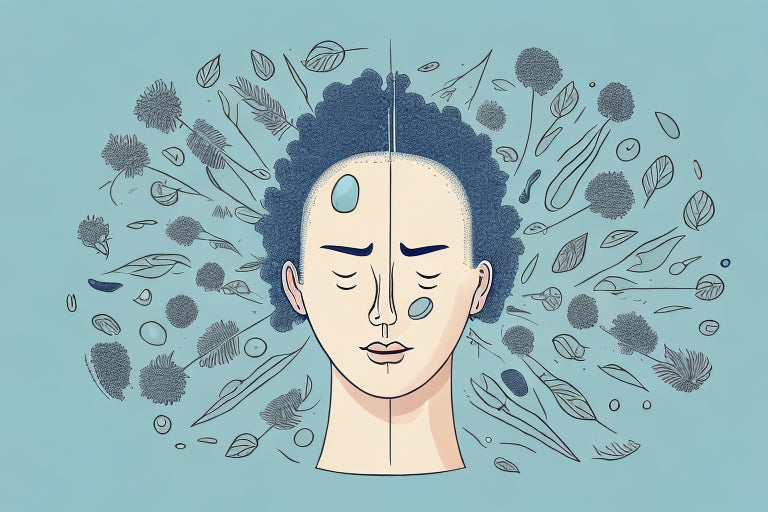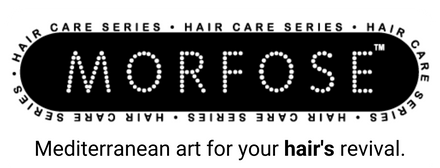Natural Remedies for an Itchy Scalp Treatment
Posted by MORFOSE COSMETICS

Natural Remedies for an Itchy Scalp Treatment
An itchy scalp can be a frustrating and uncomfortable problem to deal with. While there are many commercial products available for treating an itchy scalp, natural remedies can often be just as effective and gentler on your skin. Here are seven natural remedies that can help relieve an itchy scalp.
Understanding the Causes of an Itchy Scalp
Before we look at remedies for an itchy scalp, it's important to understand what can cause itchy scalp in the first place. Multiple factors can contribute to an itchy scalp, including:
Dandruff and Dry Scalp
Dandruff and dry scalp are two of the most common causes of an itchy scalp. Flakes of dead skin, oil, and dirt can build up on the scalp, leading to irritation and itching. Dandruff is a common condition that affects many people. It is caused by an overgrowth of yeast on the scalp, which leads to the flaking and itching. Dry scalp, on the other hand, is caused by a lack of moisture on the scalp, which can be due to a variety of factors, including cold weather, harsh shampoos, and hot showers.
Psoriasis and Eczema
Psoriasis and eczema are two skin conditions that can affect the scalp, causing redness, itchiness, and soreness. Psoriasis is an autoimmune disorder that causes the skin cells to grow too quickly, leading to thick, scaly patches on the skin. Eczema, on the other hand, is a chronic condition that causes the skin to become inflamed and itchy. Both of these conditions can be triggered by stress, certain medications, and environmental factors.
Allergic Reactions and Sensitivities
Sometimes, an itchy scalp can be the result of an allergic reaction or sensitivity to certain hair products or ingredients. Common allergens include fragrances, preservatives, and dyes. If you suspect that you may be allergic to a certain product, it's important to stop using it and speak to a dermatologist to determine the cause of your reaction.
Fungal Infections
Fungal infections, such as ringworm, can lead to an itchy scalp and can even cause hair loss if left untreated. Ringworm is a fungal infection that can affect the scalp, causing red, itchy patches. Other symptoms of a fungal infection may include flaking, scaling, and hair loss. If you suspect that you may have a fungal infection, it's important to seek medical treatment right away.
Overall, an itchy scalp can be caused by a variety of factors, and it's important to determine the underlying cause in order to find the most effective treatment. If you're experiencing persistent itching or other symptoms, it's important to speak to a dermatologist or other healthcare provider to determine the cause of your symptoms and find the best course of treatment for you.
The Importance of a Healthy Scalp
Maintaining a healthy scalp is not only important for the appearance of your hair, but it can also prevent itchiness, dandruff, and other scalp problems. A healthy scalp means healthy hair, and there are several ways to achieve this.
Maintaining a Balanced pH Level
Did you know that the pH level of your scalp can affect its overall health and function? The ideal pH level for your scalp is between 4.5 and 5.5, which is slightly acidic. Using pH-balanced hair products can help maintain a healthy pH level, preventing irritation and itchiness. When the pH level of your scalp is out of balance, it can lead to an overgrowth of bacteria and fungus, which can cause dandruff and other scalp problems.
Additionally, if you have color-treated hair, it's important to use products that are specifically formulated for colored hair. These products will have a lower pH level to help protect the color and maintain its vibrancy.
Proper Hydration and Moisture
Just like the rest of your body, your scalp needs water to stay healthy. Ensuring that your scalp is properly hydrated and moisturized can prevent itchiness and other scalp problems. Drinking enough water is essential for overall health, including the health of your scalp. In addition to drinking water, using moisturizing hair products can help keep your scalp healthy and happy.
If your scalp is dry, it can lead to flakiness and dandruff. Using a deep conditioning treatment once a week can help restore moisture to your scalp and hair. You can also try using a leave-in conditioner to keep your hair and scalp hydrated throughout the day.
Preventing Inflammation and Irritation
Avoiding harsh chemicals and irritating hair products can help prevent inflammation and irritation, which can lead to an itchy scalp. Some hair products contain ingredients that can be harsh on your scalp, such as sulfates and alcohol. These ingredients can strip your scalp of its natural oils, leading to dryness and irritation.
When choosing hair products, look for ones that are free of sulfates and alcohol. You can also try using natural hair products, such as those made with essential oils and plant-based ingredients. These products are gentler on your scalp and can help prevent irritation and inflammation.
In conclusion, maintaining a healthy scalp is essential for healthy hair. By maintaining a balanced pH level, proper hydration and moisture, and preventing inflammation and irritation, you can keep your scalp healthy and happy.
Are you tired of constantly scratching your itchy scalp? While there are many over-the-counter products that claim to relieve itchiness, you may want to consider natural remedies for a more holistic approach. Here are some additional details about the natural remedies mentioned above:Apple cider vinegar has been used for centuries for its health benefits. In addition to its potential to reduce scalp itching, it may also help with dandruff and hair loss. When using apple cider vinegar on your scalp, be sure to dilute it with equal parts water to avoid irritation.Tea tree oil is derived from the leaves of the tea tree plant and has been used for its medicinal properties for centuries. In addition to its antifungal and antibacterial properties, it may also help with acne and skin irritation. When using tea tree oil on your scalp, be sure to mix it with a carrier oil to avoid irritation.Aloe vera is a succulent plant that has been used for medicinal purposes for thousands of years. It is known for its ability to soothe and hydrate the skin, making it an excellent choice for relieving scalp itchiness. When using aloe vera gel on your scalp, be sure to choose a pure, organic product to avoid any potential irritants.Coconut oil is a natural oil that is derived from the meat of mature coconuts. It is rich in fatty acids and has moisturizing properties that can help soothe a dry, itchy scalp. When using coconut oil on your scalp, be sure to warm it up slightly to make it easier to apply.Lavender oil is a versatile essential oil that is known for its calming properties. In addition to its potential to relieve scalp itchiness, it may also help with anxiety and insomnia. When using lavender oil on your scalp, be sure to mix it with a carrier oil to avoid irritation.Jojoba oil is a natural oil that is derived from the seeds of the jojoba plant. It is similar in composition to the oils naturally produced by our skin, making it an excellent choice for moisturizing the scalp. When using jojoba oil on your scalp, be sure to massage it in thoroughly to promote absorption.Peppermint oil is an essential oil that is derived from the peppermint plant. It has a cooling effect that can help soothe scalp itchiness and inflammation. When using peppermint oil on your scalp, be sure to mix it with a carrier oil to avoid irritation.In addition to using natural remedies, it is important to take care of your scalp by washing it regularly with a gentle shampoo and avoiding harsh chemicals and styling products. By incorporating these natural remedies and taking care of your scalp, you can promote overall scalp health and alleviate the discomfort of an itchy scalp.

